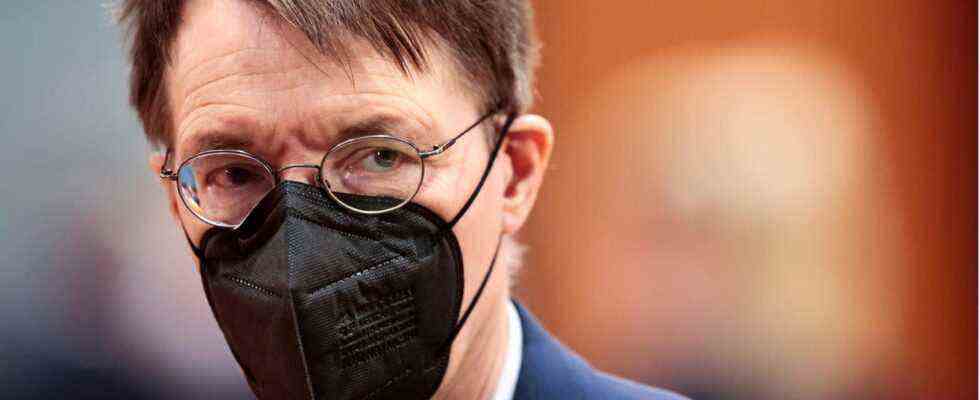Compulsory vaccination debate
The federal government missed two vaccination targets – Lauterbach waived its own application for mandatory vaccination
Federal Health Minister Karl Lauterbach had recently said that he would support an application for compulsory vaccination. But he does not want to present his own proposal now.
© Hannibal Hanschke / Picture Alliance
After taking office, the new federal government surprisingly spoke out in favor of compulsory vaccination – including Federal Health Minister Karl Lauterbach. He continues to support the idea, but does not want to submit his own application.
Austria has already introduced it and in Italy it applies to people over 50 years of age. Now Germany wants to follow suit. In the future there could also be a general compulsory vaccination in this country. Because the epidemic emergency is suspended, the members of the Bundestag should vote on it without being forced to a parliamentary group. Initial proposals for implementing mandatory vaccination have already been submitted. From the ranks of the FDP, however, came a motion against the obligation.
Federal Minister of Health Karl Lauterbach announced that he wanted to forego his own application. The SPD politician told the news portal “The Pioneer” on Wednesday: “I have decided not to present my own proposal, but to be neutral.” Presenting your own draft to Parliament would definitely be “not such a smart idea”. As health minister he had to maintain “a certain neutrality”.
Karl Lauterbach wants to maintain a certain “neutrality”
In the matter he stands “shoulder to shoulder” with Federal Chancellor Olaf Scholz (also SPD), assured Lauterbach. “We are clear advocates of mandatory vaccination.” The minister does not see any particular time pressure. For the Omikron variant, the compulsory vaccination no longer plays a decisive role. It has to work in perspective, “so that the wave can be averted in autumn”.
As things stand at the moment, the opposition Christian Democrats do not want to submit their own application to introduce compulsory vaccination. The parliamentary executive of the Union faction, Thorsten Frei (CDU), however, was open to plans to introduce compulsory vaccinations for “particularly vulnerable people” and referred to Italy, where the corresponding guidelines apply to people aged 50 and over.
The goal must be to prevent an overload of the health system, said Frei. That is why it makes sense “to ensure a high level of vaccination coverage where the risk of people having to go to hospital or even to intensive treatment is particularly high”.
The vaccination goals of the federal government
In order to prevent this, the new federal government decided on three vaccination targets. But the balance has so far been sobering. In mid-November, Chancellor Olaf Scholz announced that 30 million vaccinations would be administered by the end of January. This was already achieved at Christmas, which Scholz took as an opportunity to formulate the next vaccination goal: 30 million vaccinations by the end of January. It is not entirely clear whether this can be achieved. Most recently, the rapid progress in vaccination had stalled again. Fewer people were vaccinated over the holidays, Lauterbach told the news portal “The Pioneer”. You have to work at full speed to push the vaccination progress again.
Olaf Scholz had also announced that he would achieve an 80 percent vaccination rate among the first vaccinations by January 7th. However, at the end of last year this ambitious target had to be corrected. In order to reach 80 percent, 4.4 million unvaccinated people would currently have to be immunized. In the past two weeks since Christmas, however, there have only been a few tens of thousands a day, a little more than 600,000 together. Now the quota should be reached by the end of January.
The third vaccination goal includes compulsory vaccination. However, there is still a problem here. Shortly after taking office, Olaf Scholz had spoken out in favor of a general compulsory vaccination, despite his repeatedly expressed rejection. It should come into force at the beginning of February or March. The fact that he has now delegated the decision on the introduction to the members of parliament has given him some criticism. The opposition accuses him of a lack of leadership. SPD parliamentary group leader Rolf Mützenich had then presented a schedule for the decision on mandatory vaccination. At the end of January, for example, key points for a draft law are to be presented, on the basis of which the MPs should discuss a group proposal. A decision is expected for the end of March – a lot later than Olaf Scholz initially announced.
WHO advises that the mandatory vaccination should be limited in time
The World Health Organization (WHO) had recommended vaccination as a last resort if people could not otherwise be convinced of the benefits of vaccination. “We always call for a vaccination requirement to be clear, unambiguous and time-limited,” said WHO Emergency Aid Coordinator Mike Ryan. This step must be accompanied by appropriate risk communication. All possibilities must be exhausted to inform citizens accordingly. In addition, it must be ensured that “the results of compulsory vaccination for public health and society outweigh the impairment of individual rights or individual freedoms.”
Compulsory vaccination through the front door – in these countries the anti-corona pikser is mandatory
12 images
On Thursday, an independent committee of experts will discuss whether the current situation can still be classified as an international health emergency. The “national health emergency” has been in place for almost two years and is the highest level of alert that the WHO can call. An end to the emergency would have no practical consequences. However, experts warn of the wrong signal.
Sources: DPA, ORF

